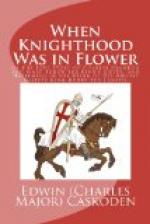The duel created a sensation throughout the kingdom, for although little was known as to who Judson was, his fame as a duelist was as broad as the land. He had been at court upon several occasions, and, at one time, upon the king’s birthday, had fought in the royal lists. So the matter came in for its share of consideration by king and courtiers, and young Brandon became a person of interest. He became still more so when some gentlemen who had served with him in the continental wars told the court of his daring and bravery, and related stories of deeds at arms worthy of the best knight in Christendom.
He had an uncle at the court, Sir Thomas Brandon, the king’s Master of Horse, who thought it a good opportunity to put his nephew forward and let him take his chance at winning royal favor. The uncle broached the subject to the king, with favorable issue, and Charles Brandon, led by the hand of fate, came to London Court, where that same fate had in keeping for him events such as seldom fall to the lot of man.
CHAPTER II
How Brandon Came to Court
When we learned that Brandon was coming to court, every one believed he would soon gain the king’s favor. How much that would amount to none could tell, as the king’s favorites were of many sorts and taken from all conditions of men. There was Master Wolsey, a butcher’s son, whom he had first made almoner, then chief counselor and Bishop of Lincoln, soon to be Bishop of York, and Cardinal of the Holy Roman Church.
From the other extreme of life came young Thomas, Lord Howard, heir to the Earl of Surrey, and my Lord of Buckingham, premier peer of the realm. Then sometimes would the king take a yeoman of the guard and make him his companion in jousts and tournaments, solely because of his brawn and bone. There were others whom he kept close by him in the palace because of their wit and the entertainment they furnished; of which class was I, and, I flatter myself, no mean member.
To begin with, being in no way dependent on the king for money, I never drew a farthing from the royal treasury. This, you may be sure, did me no harm, for although the king sometimes delighted to give, he always hated to pay. There were other good reasons, too, why I should be a favorite with the king. Without meaning to be vain, I think I may presume to say, with perfect truth, that my conversation and manners were far more pleasing and polished than were usual at that day in England, for I made it a point to spend several weeks each year in the noble French capital, the home and center of good-breeding and politeness.
My appointment as Master of the Dance, I am sure, was owing entirely to my manner. My brother, the baron, who stood high with the king, was not friendly toward me because my father had seen fit to bequeath me so good a competency in place of giving it all to the first-born and leaving me dependent upon the tender mercies of an elder brother. So I had no help from him nor from any one else. I was quite small of stature and, therefore, unable to compete, with lance and mace, with bulkier men; but I would bet with any man, of any size, on any game, at any place and time, in any amount; and, if I do say it, who perhaps should not, I basked in the light of many a fair smile which larger men had sighed for in vain.




